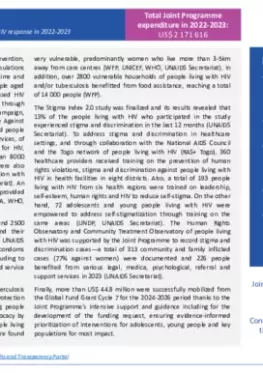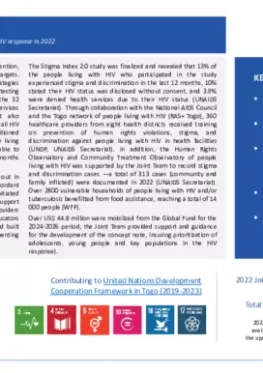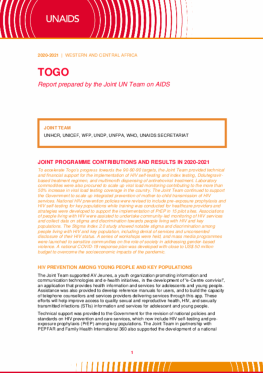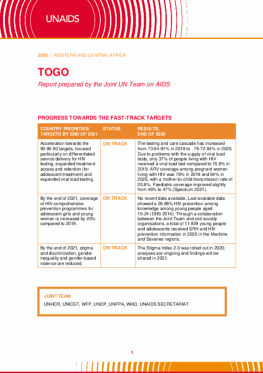|
Togo
During the 2022-2023 biennium, Togo scaled up HIV prevention, testing and treatment services among vulnerable and key populations with strategic support from the Joint Programme. In Maritime and Savanes regions, nearly 54 000 adolescents and young people aged 15-24 years and 3400 sex workers and their clients accessed HIV prevention, testing and family planning information services through collaboration with six civil society organizations (UNFPA). A campaign, launched in commemoration of the 2022 International Day Against Drug Abuse and Illicit Trafficking, reached 250 sex workers and people who use drugs in Lomé with combination HIV prevention services, of whom 105 people had voluntary counselling and testing for HIV, hepatitis B and sexually transmitted infections. More than 8000 condoms, as well as lubricants and information leaflets were also distributed during this campaign implemented in collaboration with the non-governmental organization FAMME (UNAIDS Secretariat). An HIV testing campaign in paediatric healthcare facilities also provided HIV testing services to 7788 children aged 0-14 years (UNFPA, WHO, UNAIDS Secretariat).
PrEP programmes were rolled out in 38 pilot sites, and around 2500 people, including serodiscordant couples, sex workers and their clients were initiated on PrEP by the end of 2023 (WHO, UNAIDS Secretariat). Besides, nearly 27 million male and female condoms were distributed to communities across the biennium, including to adolescents and young people through mobile campaigns and service sites (UNFPA).
In June 2023, the Government officially declared HIV and tuberculosis as criteria of vulnerability to access non-contributory social protection based on evidence from a vulnerability assessment among people living with HIV and tuberculosis and following intensive advocacy by the Joint Programme. The study highlighted that 75% of people living with HIV surveyed were vulnerable, of whom almost 7% were found very vulnerable, predominantly women who live more than 3-5km away from care centres (WFP, UNICEF, WHO, UNAIDS Secretariat). In addition, over 2800 vulnerable households of people living with HIV and/or tuberculosis benefitted from food assistance, reaching a total of 14 000 people (WFP).
The Stigma Index 2.0 study was finalized and its results revealed that 13% of the people living with HIV who participated in the study experienced stigma and discrimination in the last 12 months (UNAIDS Secretariat). To address stigma and discrimination in healthcare settings, and through collaboration with the National AIDS Council and the Togo network of people living with HIV (RAS+ Togo), 360 healthcare providers received training on the prevention of human rights violations, stigma and discrimination against people living with HIV in health facilities in eight districts. Also, a total of 193 people living with HIV from six health regions were trained on leadership, self-esteem, human rights and HIV to reduce self-stigma. On the other hand, 72 adolescents and young people living with HIV were empowered to address self-stigmatization through training on the same areas (UNDP, UNAIDS Secretariat). The Human Rights Observatory and Community Treatment Observatory of people living with HIV was supported by the Joint Programme to record stigma and discrimination cases—a total of 313 community and family inflicted cases (77% against women) were documented and 226 people benefited from various legal, medica, psychological, referral and support services in 2023 (UNAIDS Secretariat).
Finally, more than US$ 44.8 million were successfully mobilized from the Global Fund Grant Cycle 7 for the 2024-2026 period thanks to the Joint Programme’s intensive support and guidance including for the development of the funding request, ensuring evidence-informed prioritization of interventions for adolescents, young people and key populations for most impact.





